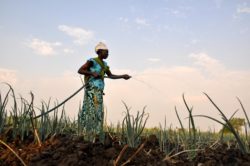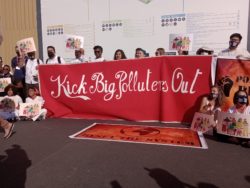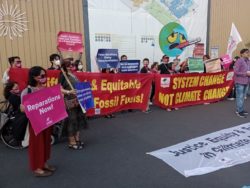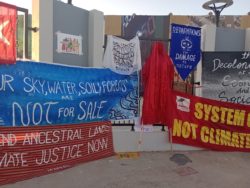CGD Webinar ‘COP27 and Global South Perspectives on the Climate Change Crisis’

Photo Source: Climate Visuals - an irrigation project in Mozambique.
On the 8th December 2022, the Centre for Global Development (CGD) hosted a panel of speakers from the University of Leeds who reflected on the recent United Nations Framework Convention on Climate Change (UNFCCC) COP27 in the Egyptian city of Sharm El-Sheikh. Beginning with an overview of the global politics of climate change, our speakers then offered reflections from a Global South perspective on the recent negotiations and what this means for climate efforts in the global south.
Dr Olaf Corry, Professor of Security Challenges in the School of Politics and International Studies (POLIS), opened the event with a presentation entitled “COPlications – the emergence of four dimensional global climate politics: cuts, contributions, capture and credits”. Setting the scene within the (increasing) complexity of global climate negotiations, Olaf explored how carbon markets can lead to further exploitation of the Global South and its resources. In doing so, he stressed the considerable uncertainty over the ‘imagined technologies’ that underpin some market-based approaches to tackling the climate crisis and how trading CO2 reductions tends to shift the responsibility and location of climate action from the Global North to the Global South. From being primarily about negotiating about cutting emissions in rich countries, COPs today resemble a complicated game of four dimensional chess where Global South countries must also navigate issues around compensation and climate. Vulnerable Global South countries push those who grew rich on carbon to cut emissions - but also demand contributions (climate finance), guard against false promises to capture and store carbon, and the trading of credits and offsets that commodify Southern natures to embody new forms of climate colonialism.

Photo Credit: Rebecca Sarku, taken at COP27 2022
Our next speaker, Dr Papiya Mazumdar, Lecturer in Global Health at POLIS, took us to India to offer a Global South perspective on climate-health impacts and policies. Papiya set this within the context of the India Led Global Mass Movement on Mission LiFE (‘Lifestyle for Environment’) framework that the COP27 high level delegation from India presented to guide governments, institutions, and societies to move towards mindful utilisation of resources. Outlining the 'Prayaas Se Prabhaav Tak' - From Mindless Consumption to Mindful Utilisation - Papiya outlined how this compendium of best practices and behaviour change frameworks is founded on the ancient Indian sustainable lifestyles of responsible consumption, circular economy, living in harmony with nature through the philosophy of ‘Vasudhaiv Kutumbkam’ (the World in One Family), sustainable resources management, co-existence and cooperation. From a Global South perspective however, tackling the climate crisis is not just about mitigation. Within this context, Papiya considered if climate-health impacts in India are integrated within the LiFE framework, and whether the discourse appears disconnected from the millions in need of appropriate adaptation and safeguarding against the increasing risks and impacts of climate change. The apparent exacerbation of health risks within specific contexts (e.g., rapid urbanisation process, informal livelihoods, infrastructural scarcity in informal settlements, and the lack of affordability for clean fuel) multiplied by the risks and adversities of climate change, faced by millions in India annually those who have sheer lack of lifestyle choices to improve upon either individual or environmental impacts. The LiFE framework as guiding principles of India’s sustainable practices cannot overlook these millions constrained for lifestyle choices and rather awaiting support for climate-health adaptation needs.
Next up Dr Rebecca Sarku, Research Fellow in Climate Change and Food Systems in the School of Earth and Environment (SEE), discussed Global South perspectives on agriculture and sustainable food systems. Having attended COP27, Rebecca reflected on the ‘Koronivia Joint Work on Agriculture’ adopted at COP23 which aimed to integrate agricultural transformation more fully into the UNFCCC. Exploring how justice and equity is discussed in the transformation agenda of the UN systems, Rebecca discussed how to unpack the actual needs of smallholder farmers and provide policy instruments to enhance food production, where there is also a need to focus on local knowledge and solutions. Connecting the COP27 Loss and Damage decision to agriculture and food security, particularly to smallholder farmers in the Global South, is key to this - yet Rebecca warned that whilst she may “celebrate loss and damage - but if loss and damage is not connected to real needs on the ground - then I think that we are far away from celebrating".

Photo Credit: Rebecca Sarku, taken at COP27 2022
Finally, Dr Simon Manda, Lecturer in International Development at POLIS and Co-Director of the CGD, presented on the topic ‘Selling Nature to Save it?’ Exploring the logics of Neoliberal Conservation and Implications for Community Livelihoods in rural Zambia”. Here Simon discussed how the strategic significance of neoliberal conservation evolves alongside a national policy and legal context, which enables mobilisation of capital and expansion of conservation initiatives at the expense of poor host communities supposed to be adapting to climate risks. Questioning how we move beyond the discourse within negotiations that ignores the capitalist contributions to the climate crisis, Simon considered how the complex processes of carbon as a commodity that can be traded have led to the expansion of ecosystem services and development schemes like Reduced Emissions from Degradation & Deforestation (REDD/REDD+). Reflecting how such schemes play out in rural Zambia, Simon discussed how they often lead to continued patterns of dispossession for local people’s rights and livelihoods, and accumulation in the hands of local elites and private sector actors. This continued reorganisation and commodification of nature will, Simon argues, inevitably limit any expectation to tackle the climate crisis.
In the Q&A, the chair of the panel, Dr Geoff Goodwin, Lecturer in Global Political Economy at POLIS and Co-Director of the CGD, asked the panellists to consider the spaces that are emerging for climate activists to force progressive change to policies and practices. Olaf believed the shift in critical attention to the extraction and production of fossil fuels rather than simply focusing on carbon emissions is a positive development that climate activists can exploit. In this regard, the Fossil Fuel Non-Proliferation Treaty is one of several promising initiatives. Climate activists should also keep a sharp critical focus on market-based initiatives and reveal their limitations and biases. Papiya believed the growth of renewable energy in India is providing some room for progressive change. However, there are huge problems with adaptation to climate change that need to be addressed, suggesting activists should focus on this issue and highlight the highly unequal effects of climate change. The catastrophic effects of extreme heat episodes on small-holder farmers in India are but one example. Rebecca suggested climate activists and social movements should push for special treatment for small-holder farmers as the COP27 loss and damage agreements overlook them. Simon developed this point and believed critical attention should be paid to the financial architecture of loss and damage and how it can be used or reformed to ensure small-holder farmers in the Global South benefit. Mel Yan, a doctoral student at POLIS, asked how tensions between social justice and environmental justice could be reconciled in the move towards more sustainable forms of agriculture. This sparked a lively debate to close the event, which highlighted the need to look for contextual solutions that support the real needs of small-holder farmers rather than blanket universal approaches.

Photo Credit: Rebecca Sarku, taken at COP27 2022
